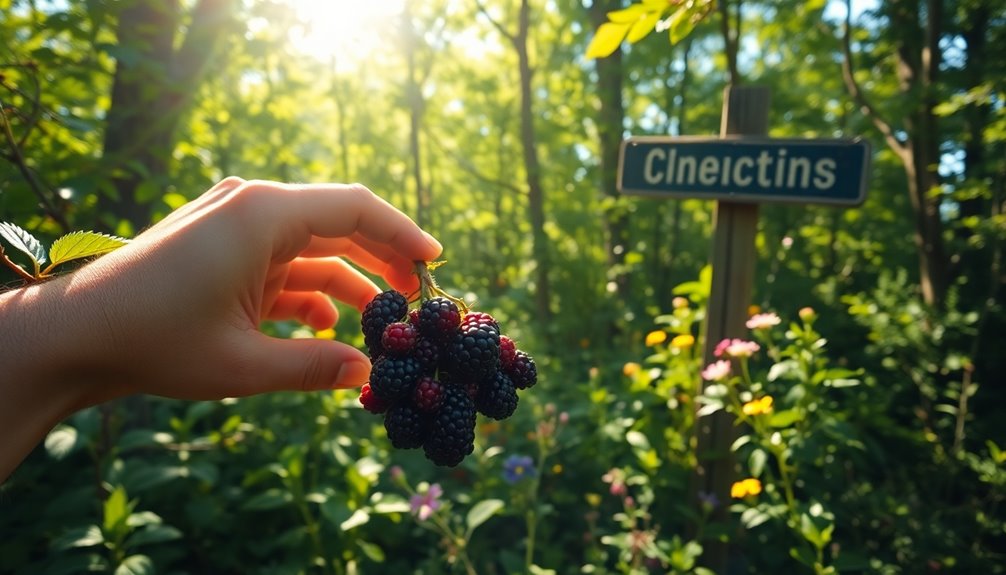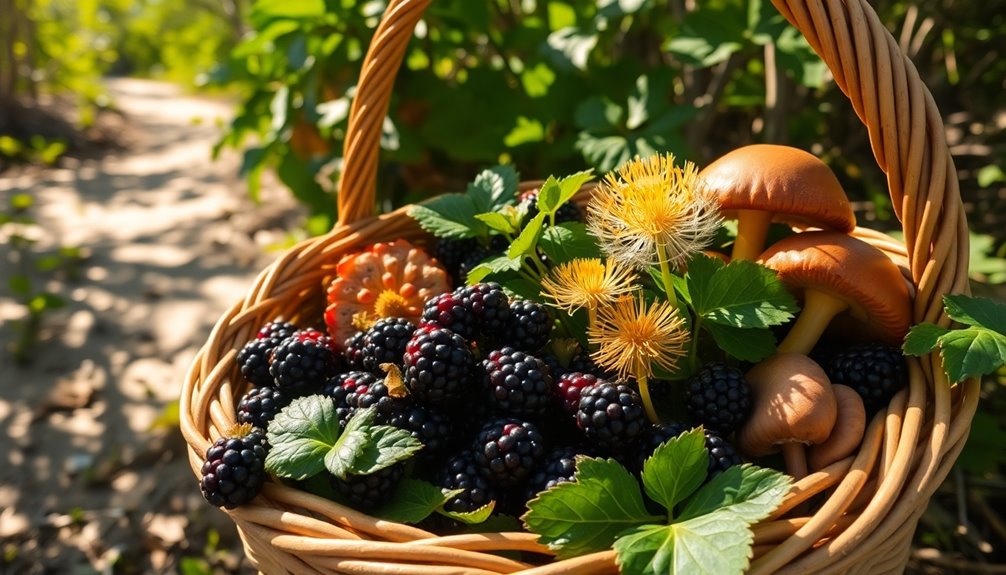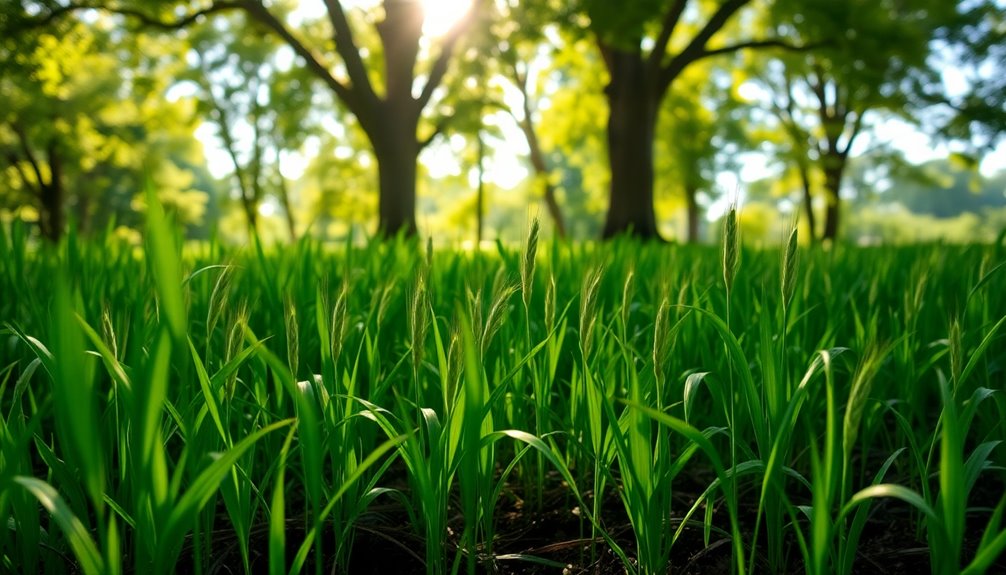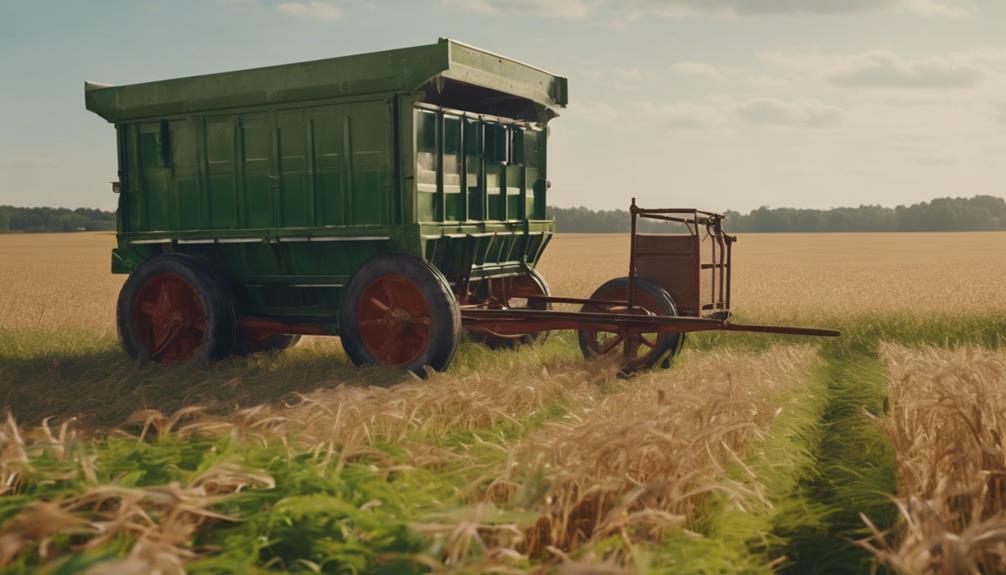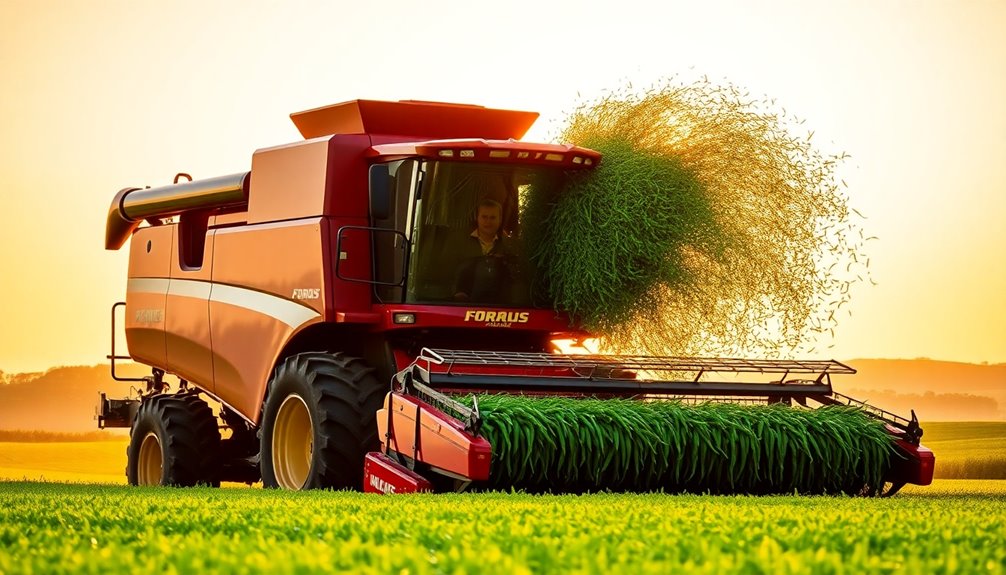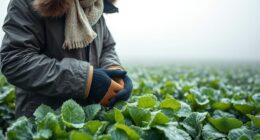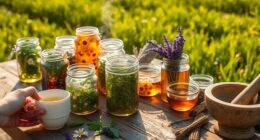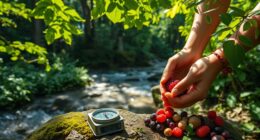Foraging in the UK isn't illegal, but it comes with important rules you need to know. You can forage for personal use on public land, but commercial foraging and trespassing on private land without permission is strictly prohibited. Protected plants and fungi are off-limits, and local byelaws may impose further restrictions. Always check local regulations and respect landowner rights to avoid fines. Misidentifying wild edibles can also pose health risks, so it's essential to educate yourself on safe practices. Keep exploring, and you'll uncover more valuable insights about foraging safely and responsibly.
Key Takeaways
- Foraging for personal use is generally legal in the UK, but commercial foraging requires landowner permission.
- Uprooting protected species, as defined under the Wildlife and Countryside Act 1981, is illegal without permission.
- Foraging on private land without the landowner's consent is considered theft under the Theft Act 1968.
- Local byelaws may impose restrictions on foraging, particularly in urban parks and conservation areas.
- Community workshops can provide education on foraging rights and sustainable practices to avoid legal issues.
Legal Framework for Foraging
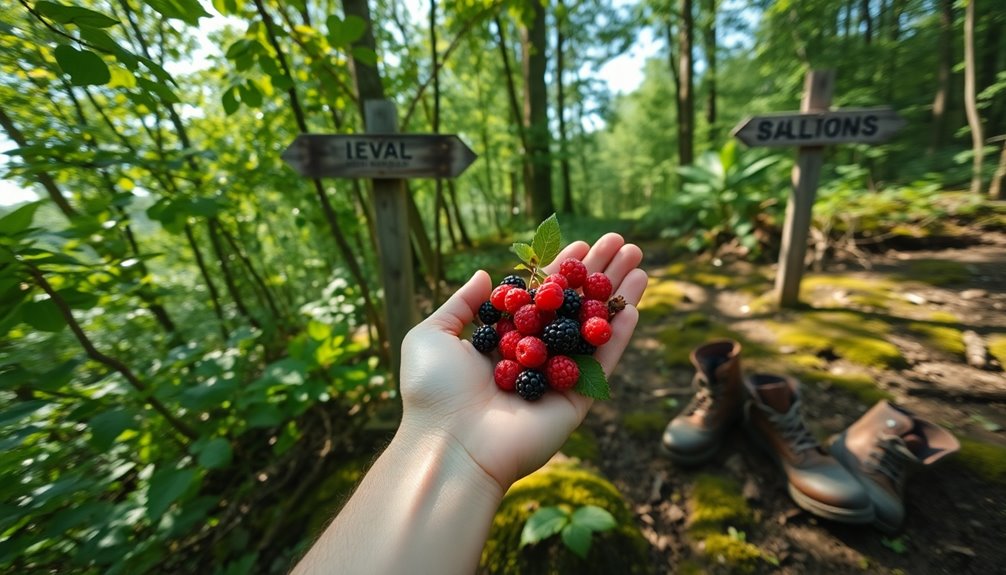
When foraging in the UK, it's vital to understand the legal framework that governs this activity. You can gather wild mushrooms, flowers, fruits, and foliage for personal use without needing the landowner's consent, thanks to the Theft Act 1968.
However, if you're planning to use your finds commercially, you'll need to steer clear of this law.
Be mindful of the Wildlife and Countryside Act 1981, which protects certain wild plants and fungi. Uprooting or damaging species listed under Schedule 8 is illegal without explicit permission. This means you must identify any protected plants before foraging.
When it comes to private land, you should remember that trespassing laws apply. Entering private land without consent can lead to civil legal issues, so it's important to respect boundaries.
On the flip side, foraging is generally allowed on public land and in designated open spaces, though regulations may vary.
Additionally, local byelaws can impose restrictions in specific locations like parks and nature reserves. Always check your local regulations to confirm you're foraging legally and responsibly.
Permissions for Private Land
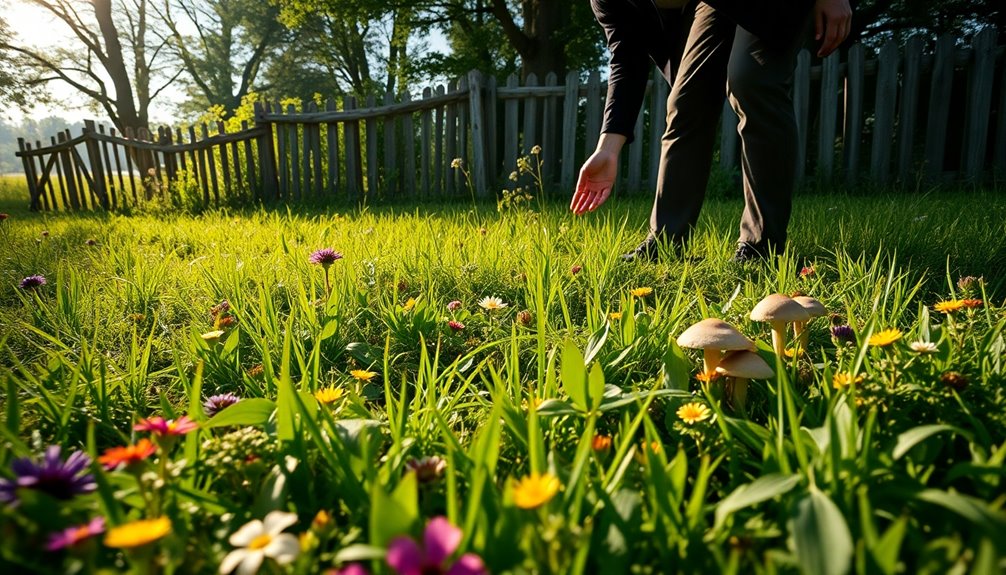
Foraging on private land in the UK requires you to obtain explicit permission from the landowner. Taking wild plants without consent is considered theft under the Theft Act 1968, which means you could face legal consequences if you forage on private land without permission.
Additionally, entering private property without the landowner's consent is classified as trespassing, another civil wrong that could lead to further repercussions.
Even if you're foraging for personal use, the Wildlife and Countryside Act 1981 mandates that you still need the landowner's approval before uprooting any wild plants. This means that before you set out on your foraging adventure, it's essential to communicate with the landowner and get the necessary permissions for private land.
Moreover, different local councils and land management authorities may have specific regulations or byelaws that govern foraging activities on private properties. So, make sure you check these regulations beforehand to avoid any legal trouble.
Being respectful of property rights not only keeps you on the right side of the law, but it also fosters good relationships with landowners in your community.
CROW Act and Public Access
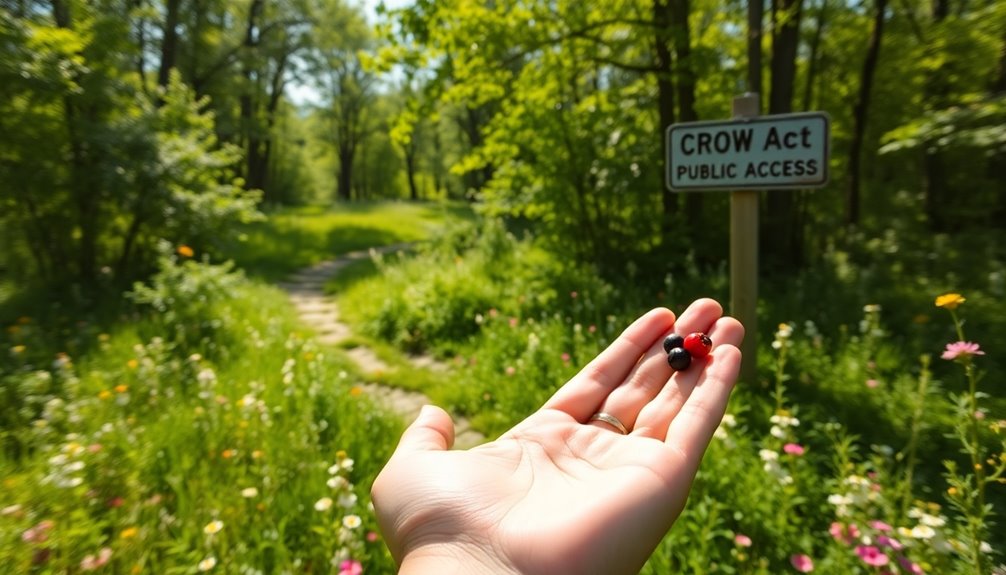
The CROW Act, or Countryside and Rights of Way Act 2000, opens up designated open land for public access, but it doesn't automatically give you the right to forage.
While you can enjoy walking on CROW land, foraging rights are a separate matter. You're generally allowed to forage along public rights of way, but you must adhere to local restrictions and byelaws.
Importantly, the CROW Act doesn't permit you to collect protected plants or fungi, as outlined in the Wildlife and Countryside Act 1981. Uprooting or damaging these species without permission is illegal.
Understanding the nuances of the CROW Act is vital for foragers. Just because you have access to land for walking doesn't mean you can freely forage.
As such, it's important to familiarize yourself with local regulations to avoid trespassing or harming protected species.
In short, while the CROW Act enhances public access to the countryside, it doesn't grant blanket foraging rights.
Always check local guidelines to confirm you're foraging legally and responsibly on CROW land.
Local Byelaws and Restrictions
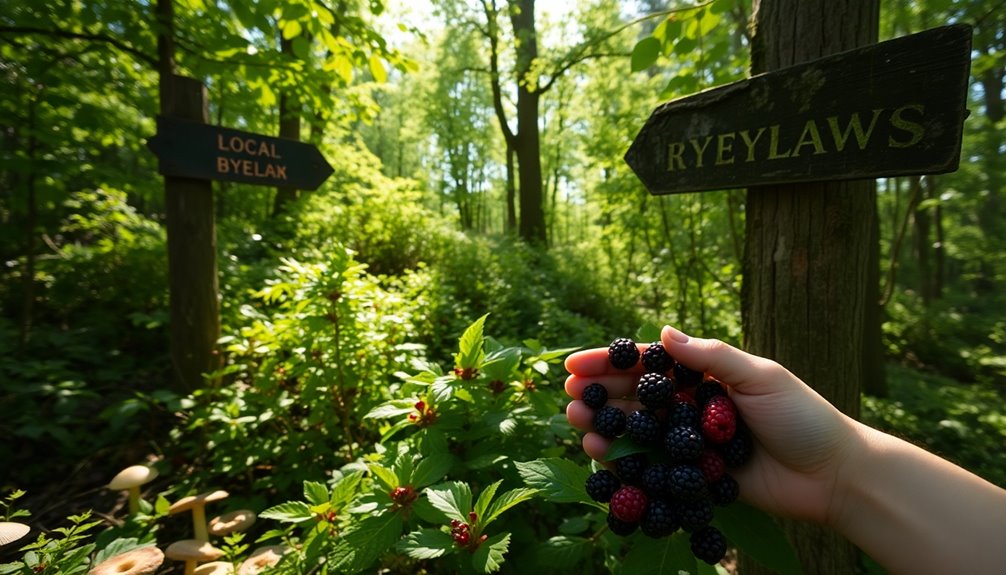
Maneuvering local byelaws and restrictions is essential for anyone interested in foraging. In various locations, local byelaws can impose limitations, especially in parks, conservation zones, and Sites of Special Scientific Interest (SSSIs), often making the collection of wild plants and fungi illegal.
If you're foraging in urban settings, be aware that city parks are frequently classified as private property, which may restrict your foraging rights, even if they seem publicly accessible.
The rules can vary considerably between local councils, so it's important to check with local authorities to understand the specific regulations that apply to your chosen area. Certain protected areas, such as the Royal Parks in London, have strict rules against interfering with plants and fungi, making foraging prohibited in those locations.
Being mindful of these local byelaws is essential for every forager. Make sure you know the legal landscape before heading out, as failing to comply with these regulations can lead to potential fines or legal action.
Always prioritize responsible foraging to protect both yourself and the natural environment.
Protected Species Legislation
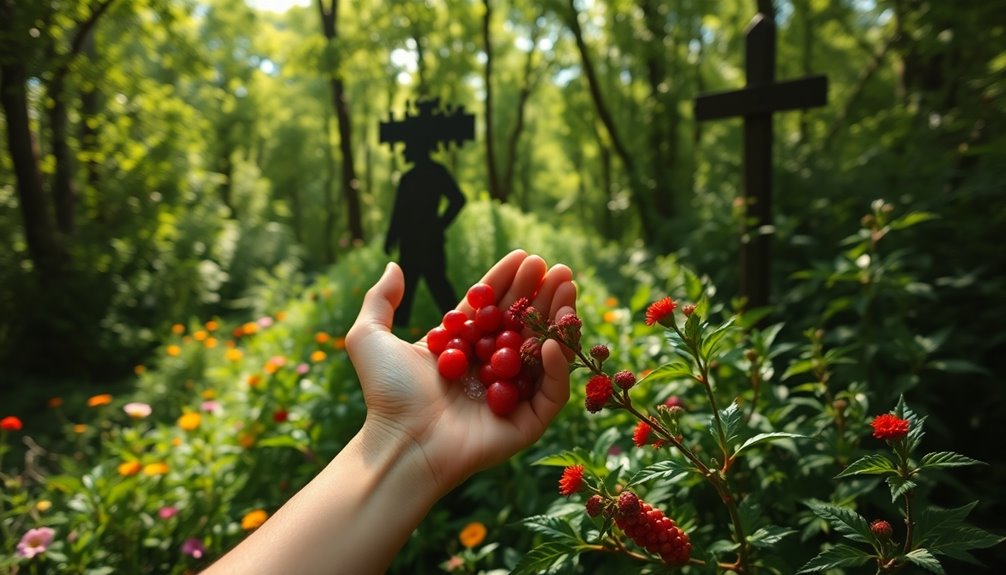
When foraging, you need to know about Schedule 8 protections, as certain wild plants and fungi are strictly off-limits without landowner permission.
Uprooting or damaging these species can lead to serious legal consequences, including prosecution.
Understanding these regulations is essential for responsible foraging and protecting biodiversity.
Schedule 8 Protections
Understanding Schedule 8 protections is vital for anyone interested in foraging in the UK, as it outlines the legal framework that safeguards certain wild plants and fungi. Schedule 8 of the Wildlife and Countryside Act 1981 lists specific species that are legally protected, making it illegal to pick, sell, or damage them without landowner permission. This legislation aims to conserve rare and threatened plants, ensuring they aren't over-exploited.
Here's a quick reference table to help you identify some Schedule 8 species:
| Common Name | Scientific Name | Notes |
|---|---|---|
| Bluebell | Hyacinthoides non-scripta | Protected due to habitat loss |
| Lady's Slipper Orchid | Cypripedium calceolus | Rare and vulnerable species |
| Yellow Marsh Saxifrage | Saxifraga hirculus | Found in wetland areas |
| Spiked Speedwell | Veronica spicata | Limited distribution in the UK |
| Coralroot Orchid | Corallorhiza trifida | Sensitive to habitat disturbance |
Being aware of these Schedule 8 species is important for you to avoid legal repercussions and contribute to biodiversity conservation efforts. Always seek landowner permission before foraging.
Uprooting Restrictions
Frequently, foragers overlook the legal implications of uprooting wild plants without permission. Under the Wildlife and Countryside Act 1981, uprooting restrictions are firmly in place to protect certain species from damage and removal. Schedule 8 of this act lists rare and protected plants, making it illegal to pick or uproot these without proper authorization.
It's essential to understand that landowners retain the right to manage and protect the wild plants on their property. This means you must obtain the landowner's permission before engaging in any foraging activities that involve uprooting plants. Not only does this respect the landowner's rights, but it also helps preserve native flora, which is critical for maintaining ecological balance and biodiversity.
Ignoring these uprooting restrictions can lead to serious consequences, including criminal charges and significant penalties like fines or restoration orders.
Legal Consequences Explained
Foragers must recognize the legal framework surrounding protected species, as failing to comply can lead to serious consequences. The Wildlife and Countryside Act 1981 protects certain wild plants and fungi, making it illegal to uproot or damage species listed under Schedule 8 without the landowner's permission. If you uproot wild plants without authorization, you're committing an offense, which underscores the significance of knowing your local protected species.
Additionally, if you engage in commercial foraging of these protected species without landowner consent, it could be considered theft under the Theft Act 1968. Many Sites of Special Scientific Interest (SSSIs) have stringent regulations against damaging protected species, often requiring specific permissions for gathering in these areas.
The legal repercussions for foraging protected species can include hefty fines and even prosecution. It's important to understand local wildlife legislation to avoid these pitfalls.
Always do your research before foraging, and make sure you're aware of the rules that apply to the areas you're exploring. By respecting the law, you can enjoy foraging while contributing to the conservation of the natural environment.
Commercial Foraging Regulations
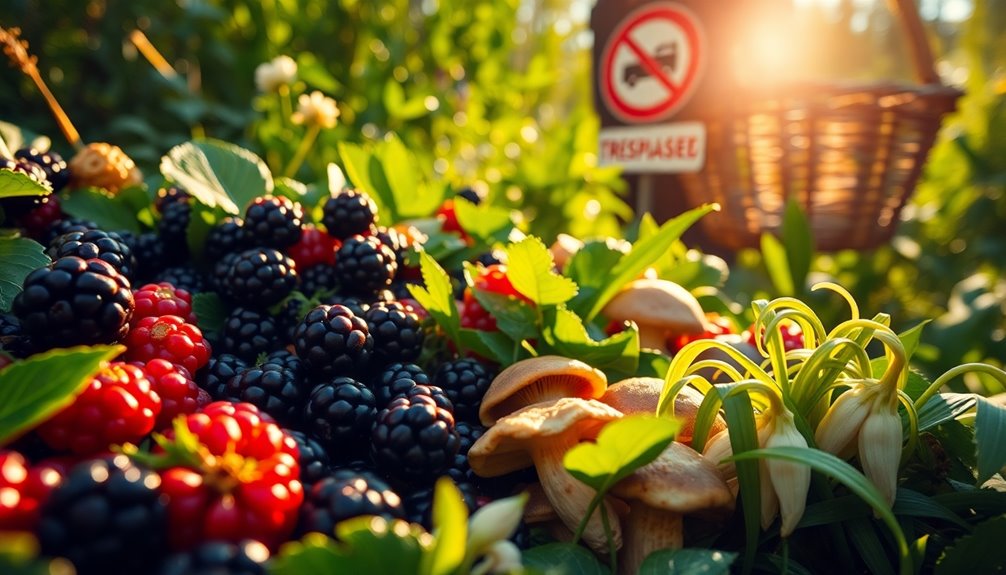
Commercial foraging in the UK comes with a maze of regulations that you need to navigate carefully. If you plan on foraging for profit, it's vital to understand the legal landscape. Under the Theft Act 1968, picking wild plants, fungi, or fruits for sale requires explicit permission from the landowner. Additionally, the Wildlife and Countryside Act 1981 protects certain species, making it illegal to gather or sell them without consent.
Here's a quick overview of key regulations:
| Regulation | Requirement | Consequence |
|---|---|---|
| Theft Act 1968 | Permission from landowner | Classified as theft |
| Wildlife and Countryside Act 1981 | No gathering of protected species | Legal penalties |
| National Nature Reserves (NNRs) | Specific permissions needed | Possible fines and charges |
| Sites of Special Scientific Interest (SSSIs) | Consent required | Legal repercussions |
Failure to comply with these regulations can lead to significant fines and even criminal charges. Understanding these rules is essential before you engage in commercial foraging. Always get the necessary permissions to avoid serious legal issues.
Environmental Impact of Foraging
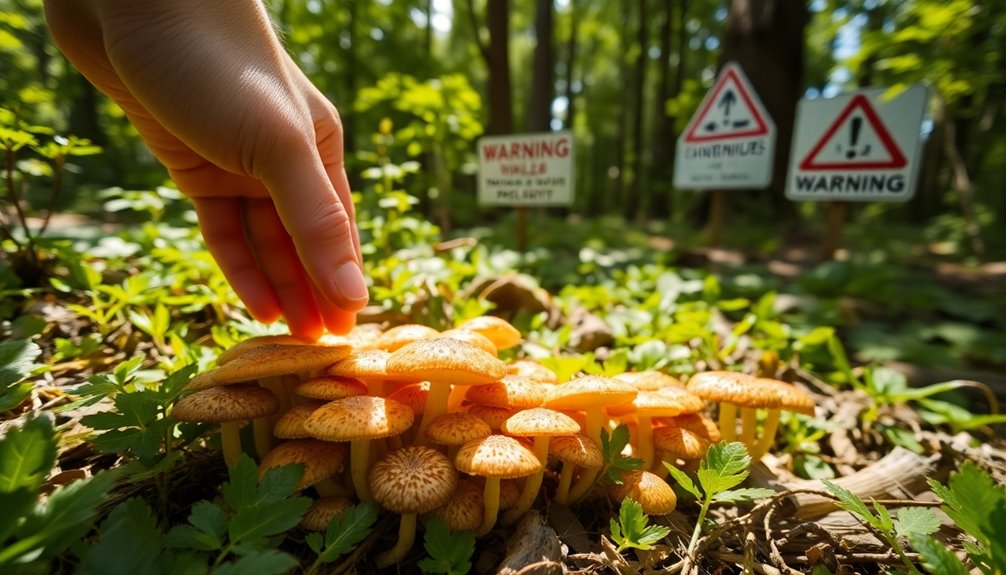
Understanding the legalities of commercial foraging is only part of the equation; the environmental impact of foraging practices is equally important. Over-foraging, especially by untrained individuals, can pose significant environmental threats. When foraging groups harvest indiscriminately in woodlands, they risk damaging fungal reproduction and harming essential plant populations.
This disruption can lead to a decline in species that depend on these plants for habitat and food. The perception of foraging is often shaped by negative stories, which can lead to stricter regulations and increased backlash against foraging communities.
That's why it's vital to educate foragers on responsible foraging practices. By promoting sustainable methods, you can help minimize ecological impacts and support conservation efforts. Understanding which plants can be harvested and in what quantities is important for maintaining balance within local ecosystems. For example, wild edible plants are abundant in many areas, but their responsible harvesting is crucial to ensure their continued availability.
You must be aware of the potential consequences of your actions and endeavor to leave the environment as you found it. By adopting responsible foraging practices, you not only enjoy the fruits of nature but also contribute to its preservation for future generations.
Community Foraging Initiatives
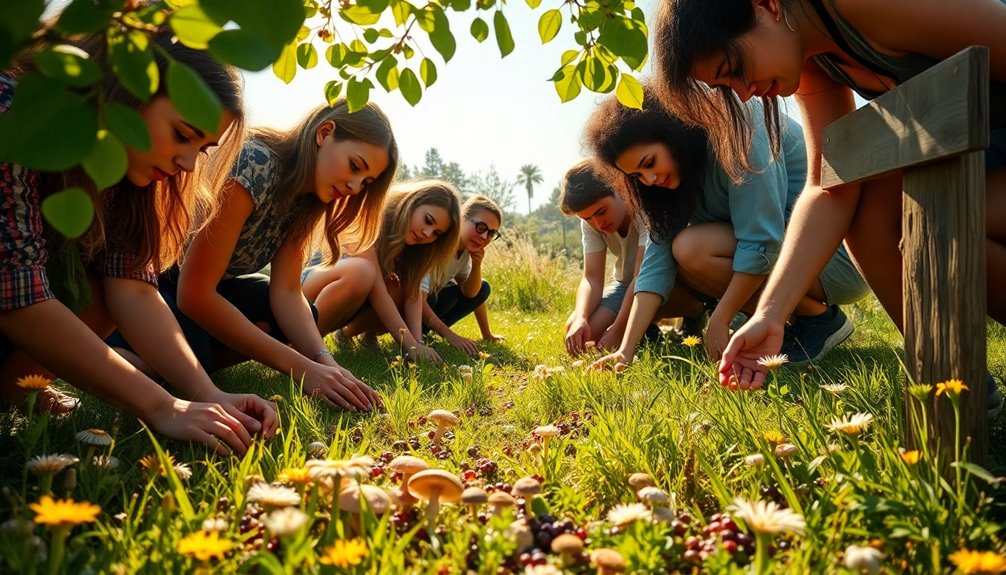
Community foraging initiatives offer you the chance to participate in local workshops where experienced foragers share their knowledge.
Through engaging activities, you can connect with others while learning safe foraging practices and the importance of sustainable harvesting.
These efforts not only enhance your understanding of local ecosystems but also strengthen your ties to the community.
Local Foraging Workshops
For those enthusiastic to explore the world of wild edibles, local foraging workshops offer a fantastic opportunity to plunge into hands-on learning about identifying edible plants and mushrooms.
These workshops provide you with expert guidance, ensuring you understand foraging laws and sustainable practices essential for responsible gathering. You'll learn about the legal framework surrounding foraging, including the importance of respecting landowner permissions and adhering to regulations regarding protected species. Additionally, understanding the impact of over-foraging can help you make more informed decisions while gathering resources.
By participating in these initiatives, you'll gain insight into the seasonal availability of various edible plants and fungi, making your foraging adventures more fruitful. The emphasis on ethical considerations will encourage you to take only what you need, helping to minimize your impact on local ecosystems.
Moreover, local authorities often support these workshops, recognizing their role in promoting community engagement and appreciation for wild foods. This not only enhances local culinary trends but also fosters a culture of sustainability. Additionally, understanding the importance of hydration can significantly enhance your foraging experience, as staying hydrated is crucial for optimal cognitive function during outdoor activities.
Community Engagement Activities
Participating in community foraging initiatives can transform your relationship with nature while connecting you with like-minded individuals. These initiatives often include local classes and workshops led by experienced foragers, educating you on safe and responsible foraging practices. You may also discover how to create masterful weaving techniques for crafting foraging baskets during these sessions, while also learning about the importance of digital literacy programs that enhance communication in community settings.
You'll learn about local edible plants while building social connections through shared experiences in the great outdoors.
Many communities organize foraging events that emphasize sustainable practices, encouraging respect for ecosystems and adherence to legal foraging guidelines. By engaging with local authorities and landowners, you can clarify your foraging rights and understand the legal framework governing your activities.
Collaborative foraging projects can enhance community gardens, incorporating foraged foods into fresh produce for local residents. This not only fosters a sense of community but also promotes sustainable living practices.
As you participate, you'll appreciate the balance between enjoying nature's bounty and protecting it for future generations. Additionally, many foraging groups provide resources on essential survival gear items that can enhance your outdoor experience and ensure safety.
Getting involved in these initiatives can empower you to make informed choices, advocate for responsible foraging, and enjoy the benefits of local, foraged foods.
Embrace this opportunity to connect with your community and nature while cultivating a deeper understanding of sustainable practices.
Safety and Health Concerns
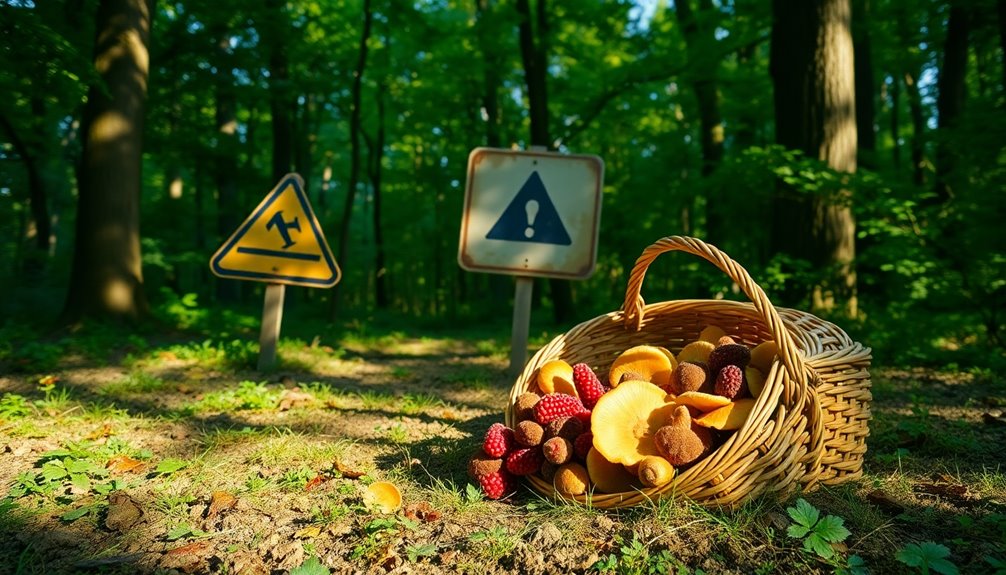
How can you guarantee safety while foraging in the wild? First, always be aware of the potential health risks associated with consuming wild foods. Foraging can provide nutritious options, but misidentifying wild mushrooms can lead to serious food poisoning or toxicity.
It's essential to educate yourself on safe foraging practices and plant identification to avoid harmful species. Start with small amounts of any foraged items to test for allergic reactions or toxicity, especially since your body may react differently to wild foods than to cultivated ones.
While many people believe their senses can detect toxic plants, caution is imperative with mushrooms due to their similar appearances to safe varieties. Additionally, be mindful of over-foraging, which can disrupt local ecosystems.
Sustainable foraging practices help preserve biodiversity and guarantee that nature remains healthy. Community awareness and training in foraging safety can greatly reduce risks, so consider joining local groups or workshops. Furthermore, understanding the importance of preventive care can improve your overall foraging experience and safety.
Practical Foraging Tips
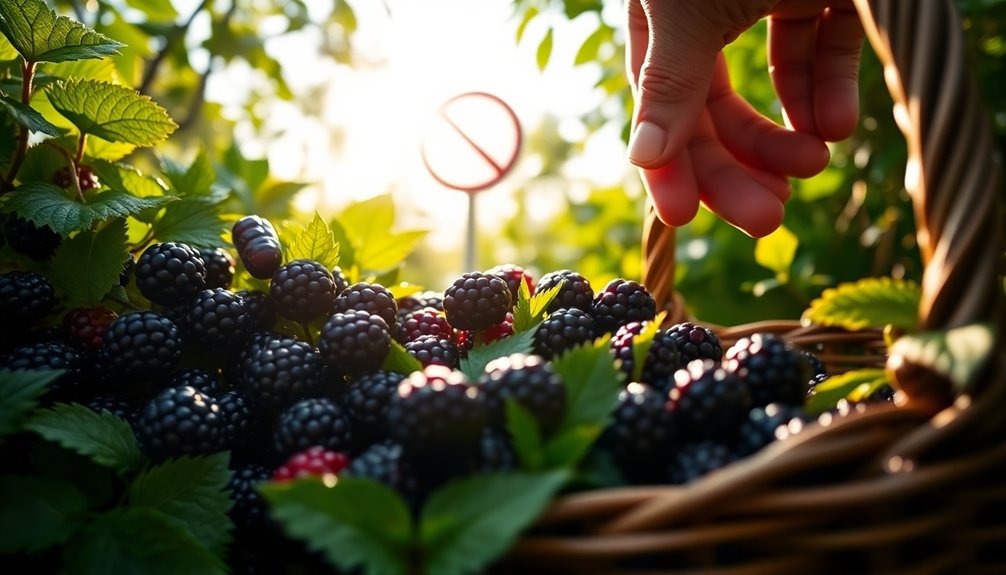
When you're foraging, it's essential to follow responsible practices, like only taking what you need and being mindful of local bylaws.
Seasonal considerations also play a big role in what you can find, so keep an eye on what's ripe and ready.
Always remember to respect the land and its regulations to guarantee a sustainable foraging experience. Additionally, consider the importance of nutritional balance by incorporating a variety of edible plants to enhance your diet while foraging.
Responsible Foraging Practices
Responsible foraging practices are essential for preserving our natural ecosystems while enjoying the bounty of the outdoors. By following these guidelines, you can guarantee that your foraging activities are both responsible and legal.
- Only forage for personal use, taking no more than 30% of any plant or mushroom from a single location.
- Familiarize yourself with local byelaws and regulations, especially in protected areas like Sites of Special Scientific Interest (SSSIs).
- Always seek permission from landowners before foraging on private land; foraging without legal access can lead to civil actions.
- Educate yourself on safe plant identification, avoiding any species you're unsure about to prevent harmful consequences.
- Consider the environmental impacts of foraging, as sustainable practices can help preserve biodiversity and protect ecosystems.
Seasonal Foraging Considerations
Foraging throughout the seasons offers a unique opportunity to connect with nature while enhancing your culinary adventures. Each season presents distinct wild foods, making seasonal foraging an exciting and enriching experience. Here's a quick reference guide to help you navigate your foraging journey:
| Season | Edible Finds | Tips for Foraging |
|---|---|---|
| Spring | Wild garlic, nettles | Take no more than 30% of a plant. |
| Summer | Elderflowers, berries | Look for ripe fruits; check for pests. |
| Autumn | Mushrooms, hazelnuts | Learn to identify mushrooms correctly. |
| Winter | Seaweed, roots | Focus on coastal areas and foraging events. |
| Year-Round | Dandelion leaves, herbs | Respect local byelaws; avoid protected sites. |
While you enjoy these seasonal delights, remember to only collect what you plan to use. This minimizes waste and promotes sustainable practices. Engaging in community foraging events can deepen your knowledge of local species and ethical foraging practices, allowing for a more responsible connection with the environment. Always stay aware of local byelaws to guarantee your foraging adventures remain enjoyable and legal.
Local Bylaws Awareness
Maneuvering through local bylaws is essential for anyone interested in foraging, as regulations can vary considerably across regions.
To guarantee your foraging activities remain legal and responsible, keep these tips in mind:
- Check local regulations: Visit your local council's website to understand specific bylaws related to foraging in your area.
- Respect private property: Always obtain permission from landowners before foraging in city parks or on private lands to avoid trespassing.
- Know protected areas: Familiarize yourself with locations like conservation zones or Sites of Special Scientific Interest (SSSIs), where foraging may be restricted or prohibited.
- Engage with local groups: Join foraging classes or community groups to learn about local bylaws and best practices for foraging responsibly.
Frequently Asked Questions
Is Foraging Illegal in the UK?
Foraging isn't illegal in the UK as long as you follow certain guidelines. You can pick wild fruits, mushrooms, and flowers for personal use, but you can't trespass on private land.
Be mindful of protected species and local bylaws, which may limit foraging in parks and nature reserves. If you want to sell your foraged finds, you'll need permission from the landowner.
Always forage responsibly to enjoy the experience without legal issues.
Is It Illegal to Forage for Food?
Foraging for food isn't outright illegal, but you need to be careful.
You can gather wild mushrooms, fruits, and flowers, as long as you're not trespassing on private land.
Just remember, some plants are protected, so check if what you're picking is allowed.
If you're foraging on public land, look up local bylaws first, as they might've specific rules.
Stay informed, and you can enjoy your foraging adventure safely!
Can You Forage in Parks in the UK?
Did you know that around 80% of city parks in the UK have some restrictions on foraging?
When you're considering foraging in these parks, you need to check local bylaws first. Many parks are classified as private property, so you'll often require permission from the landowner or local authority.
In places like Royal Parks, foraging is typically prohibited. Always verify local guidelines to stay compliant and avoid any surprises!
Is It Illegal to Pick Wild Garlic in the UK?
It's not illegal to pick wild garlic in the UK for personal use, as long as you're foraging on accessible land.
Just remember, if you're on private property, you'll need the landowner's permission.
Make sure you correctly identify wild garlic, since some lookalikes can be toxic.
Also, be mindful of local bylaws that might restrict foraging in certain areas, so check those out before you head out to collect your tasty treat!
Conclusion
In the UK, foraging can be a tricky endeavor, especially with various laws and regulations in place. Did you know that around 1 in 5 wild food foragers have faced legal issues while gathering? It's essential to understand the legal framework and respect private lands to avoid turning your snack hunt into a crime. By staying informed and practicing responsible foraging, you can enjoy nature's bounty without the worry of breaking the law. Happy foraging!

